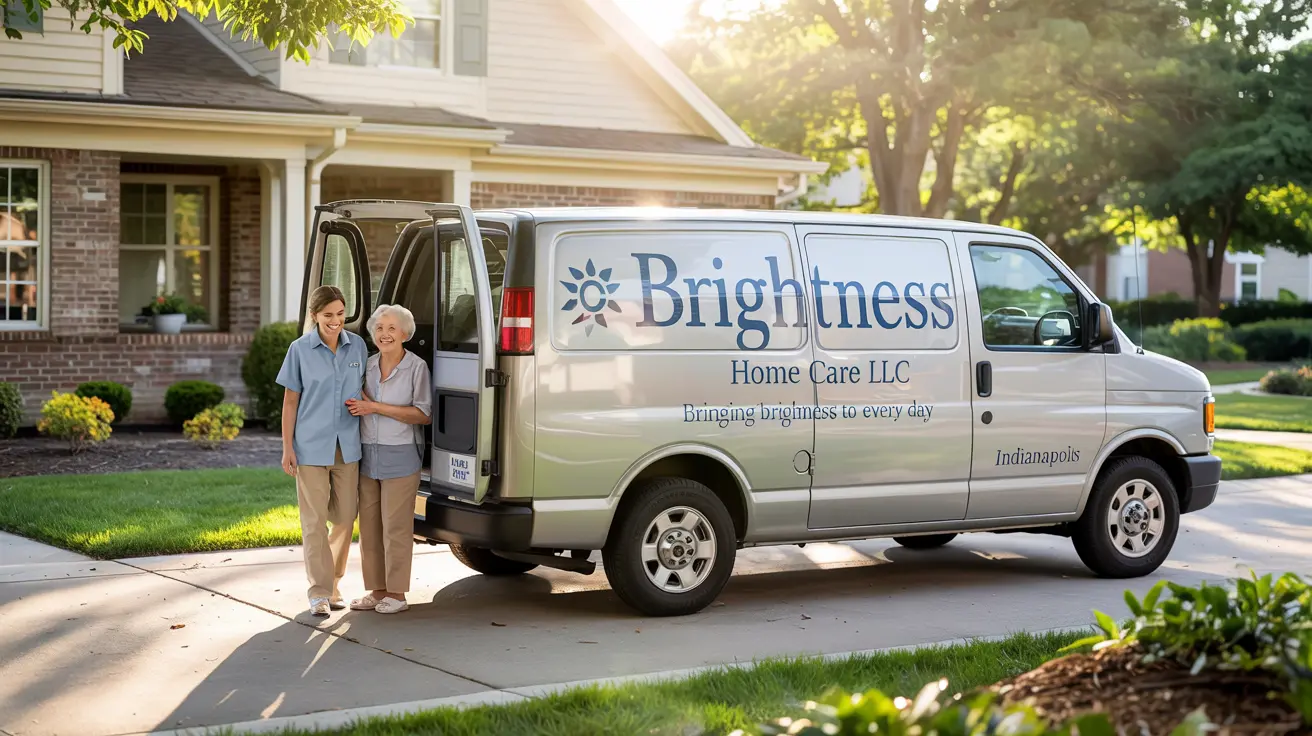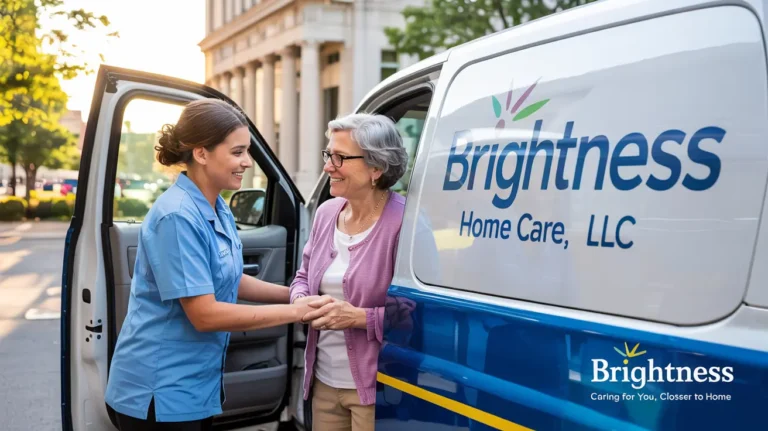Memory Care Transportation Services in Indianapolis: A Complete Guide for Families
Did you know that over 5.8 million Americans are living with Alzheimer’s disease, and many of them rely on others for transportation? I learned this the hard way when my uncle was diagnosed with dementia a few years back. Getting him to his doctor’s appointments became an unexpected challenge that our family wasn’t prepared for!
Transportation might seem straightforward to most people, but for those with memory conditions, it can be a source of tremendous anxiety and confusion. I remember the first time we tried taking Uncle Joe to his memory clinic appointment using a standard ride service. The unfamiliar driver, the strange vehicle, the changing environment – it triggered such disorientation that we never made that mistake again.
That’s where specialized memory care transportation services come into the picture. These aren’t just your regular ride services – they’re specifically designed to address the unique challenges faced by individuals with Alzheimer’s, dementia, and other memory conditions. Here in Indianapolis, families struggling with similar situations have a trusted ally in Brightness Home Care LLC, located at 4911 West 38th Street.
Throughout this article, I’ll share what I’ve learned about memory care transportation – both from my personal experiences and from countless conversations with families and healthcare providers across Indianapolis. You’ll discover what makes memory care transportation different, how to choose the right provider, and practical tips for making travel as stress-free as possible for your loved one. Trust me, the right transportation service can make all the difference in maintaining your loved one’s dignity and quality of life!
Understanding Memory Care Transportation Needs
Let me tell you something I wish someone had told me years ago – transporting someone with memory issues isn’t just about getting from point A to point B. It’s a whole different ballgame! After struggling to help my uncle with dementia get to his appointments, I quickly realized that standard transportation services just weren’t cutting it.
Individuals with Alzheimer’s or dementia face unique challenges when traveling. For starters, unfamiliar environments can trigger severe anxiety or confusion. I’ll never forget the time Uncle Joe became so disoriented during a simple trip to the doctor that he tried to exit the moving vehicle. Scary stuff! Changes in routine can also cause agitation, and many memory care patients have difficulty communicating their needs or discomfort during transit.
Safety concerns are paramount for these individuals. Beyond the obvious physical safety requirements, there’s the risk of wandering or becoming lost if left unattended even for a moment. I learned this lesson when I ran inside a pharmacy to pick up a prescription, leaving Uncle Joe in the car with my sister – he was halfway across the parking lot by the time I returned, convinced he needed to “go home” to a house he hadn’t lived in for decades.
But perhaps what’s discussed less often is the dignity factor. Transportation experiences can be deeply humiliating for someone with memory issues if not handled properly. Having a driver who doesn’t understand dementia behaviors might respond impatiently or inappropriately, making your loved one feel ashamed or agitated.
The transportation needs of memory care patients are also more diverse than you might think. Sure, there are the essential medical appointments – but what about trips to the park, visits with family, or even just a drive to get ice cream? These quality-of-life journeys are just as important for mental wellbeing, though they’re often overlooked.
I’ve found that specialized memory care transportation offers significant advantages over standard options. For one thing, drivers trained in dementia care know how to respond appropriately to confusion or agitation. They understand that sometimes you need to take the long way home because your passenger believes they live at their childhood address. They know that playing certain music might help keep someone calm, or that avoiding busy, noisy routes might prevent overstimulation.
The vehicles themselves often make a difference too. Many standard transportation services lack the proper securing mechanisms for those with mobility issues, and drivers may not be trained to assist passengers from door to door. I’ve seen firsthand how much smoother the experience can be when using a service that understands these nuances.
One thing that really surprised me was how much consistency matters. Having the same driver regularly can dramatically reduce anxiety for memory care patients. It becomes part of their routine, something familiar in a world that increasingly makes less sense to them. When Uncle Joe started recognizing his regular driver, Martin, the transformation in his demeanor was night and day – from anxious and combative to relatively calm and cooperative.
In Indianapolis specifically, weather considerations also play into transportation planning. Our brutally cold winters and sometimes sticky summers present additional challenges for elderly individuals with memory conditions. Having a service that understands how to manage these seasonal factors—keeping the vehicle at a comfortable temperature and planning for weather delays—makes a huge difference in the transportation experience.
Key Features of Quality Memory Care Transportation Services
When I started looking for better transportation options for my uncle, I had no clue what separates the okay services from the exceptional ones. Boy, did I learn quickly! After some trial and error (and a few transportation disasters I laugh about now), I discovered what really matters in memory care transportation.
First and foremost, driver training is absolutely essential. This isn’t just about knowing how to drive safely – though that’s important too! The best services employ drivers who have specific training in dementia care. These aren’t just any drivers; they understand the behavioral symptoms of Alzheimer’s and other memory conditions and know how to respond appropriately. The difference is night and day! I remember one driver who knew exactly how to redirect my uncle when he became fixated on needing to “go to work” (despite being retired for 20 years). She gently acknowledged his concern without contradicting him, then smoothly transitioned to talking about the weather. Such a simple technique, but it completely defused what could have been a stressful situation.
Door-through-door assistance is another game-changer. Curb-to-curb service (where drivers just drop off and pick up at the curb) simply doesn’t cut it for memory care patients. Quality providers offer true door-through-door service, meaning the driver actually comes to the door, helps the person navigate safely to the vehicle, ensures they’re comfortable and secure during transit, and then escorts them all the way to their destination door. This level of service eliminates the risk of wandering and confusion that can happen in those transition moments.
Vehicle features matter more than you might think. The first time I saw a properly equipped memory care transportation vehicle, I was impressed by thoughtful details like easy-entry steps, secure but dignified seatbelt systems, temperature controls for passenger comfort, and even carefully chosen music options that can help soothe anxious passengers. Some of the best services even maintain detailed preference profiles for regular clients – knowing that Mrs. Smith feels calmer listening to classical music, or that Mr. Johnson needs to sit on the right side to avoid agitation.
Scheduling flexibility is crucial because, let’s face it, things don’t always go as planned with memory care patients. The rigid scheduling of standard transportation services (“be ready at 2:15 pm sharp or we leave!”) just doesn’t work. Quality providers understand that some days are better than others, and build buffer time into their schedules. They know that sometimes it takes an extra 15 minutes just to get someone comfortable with the idea of leaving their home.
Communication protocols make a huge difference too. The best services maintain clear lines of communication with both family caregivers and healthcare providers. They’ll confirm appointments the day before, provide real-time updates during transportation if needed, and report back about how the trip went. I can’t tell you how much peace of mind this gave me, especially in the early days when I wasn’t sure how Uncle Joe would handle the trips.
Documentation practices might sound boring, but they’re super important. Quality services maintain detailed records of all transports – including any notable behaviors or concerns – which can actually provide valuable information for healthcare providers. One time, our transportation provider noticed that Uncle Joe became particularly confused on Tuesday afternoons and reported this pattern to his neurologist. This observation actually led to an adjustment in his medication timing that made a significant difference in his cognitive function!
In my experience, the most reputable services also have established protocols for handling emergencies. They know exactly what to do if a passenger becomes ill during transport, tries to exit the vehicle, or becomes severely agitated. This kind of preparation is something you hope they never need to use, but it’s incredibly reassuring to know it’s there.
Brightness Home Care LLC exemplifies these quality features in their memory care transportation services. Their attention to these critical details has made them a standout provider in the Indianapolis area. Their drivers don’t just transport people – they build relationships with their regular passengers, creating a sense of familiarity that’s incredibly valuable for those with memory conditions.
Memory Care Transportation Options in Indianapolis
When I first started exploring specialized transportation options in Indianapolis, I was honestly overwhelmed. There seemed to be so many choices, yet finding services truly equipped for memory care patients was like finding a needle in a haystack! After lots of research and some firsthand experience, I’ve learned that Brightness Home Care LLC stands out from the crowd in this specialized field.
Brightness Home Care offers comprehensive memory care transportation services that go well beyond what standard medical transport companies provide. Their approach is built around understanding the unique challenges faced by individuals with dementia and Alzheimer’s. What impressed me most was their personalized care plans – they actually take the time to learn about each client’s specific needs, triggers, and preferences. For instance, they noted that my uncle was calmer when traveling in the morning hours and adjusted his appointment pickups accordingly whenever possible.
Their service area covers most of Indianapolis, with particular focus on the northwest side where their office is located at 4911 West 38th Street. They serve neighborhoods throughout Marion County and even extend into some surrounding counties, which is fantastic for families who might live outside the immediate city limits. I’ve found their coverage area to be more extensive than many competitors who often limit their services to small geographic zones.
What really sets Brightness Home Care apart is their specialized memory care training. Every driver undergoes extensive training specifically focused on dementia care practices. This isn’t just basic “how to help someone into a car” training – they learn about different types of dementia, common behavioral challenges, de-escalation techniques, and how to maintain a calm, supportive environment during transport. One driver told me they even practice scenarios like what to do if a passenger becomes disoriented mid-journey or doesn’t recognize where they’re going.
The vehicles themselves are equipped with features that make a difference for memory care patients. They maintain a fleet of vehicles with easy entry and exit, comfortable seating that accommodates varying physical needs, and climate control that can be adjusted for individual comfort. Some vehicles even have privacy screens that can reduce overwhelming visual stimulation during travel – a small detail that can make a huge difference for someone easily overstimulated.
Compared to other transportation alternatives in Indianapolis, specialized memory care transport does cost more than standard rideshare or taxi services. However, the price difference makes sense when you consider the additional training, time, and personalized care involved. I learned this lesson the hard way after trying to save money with a standard medical transport service – the driver had no idea how to handle my uncle’s confusion, and we ended up with a traumatic experience that took weeks to overcome.
One thing many families don’t realize is that some insurance plans may cover specialized transportation. Medicare generally doesn’t cover non-emergency medical transportation, but some Medicare Advantage plans do include this benefit. Medicaid may cover transportation to medical appointments for eligible individuals. Brightness Home Care works with families to navigate these complex payment options and also offers private pay rates that, while not inexpensive, are competitive for the level of specialized care provided.
Veterans benefits are another potential source of coverage that many families overlook. The VA offers benefits that can cover transportation for eligible veterans, and Brightness Home Care has experience working with the VA system to arrange coverage. I never would have figured this out on my own – their billing specialist helped us understand all the options.
Beyond the practical aspects, what stands out about Brightness Home Care’s transportation service is the consistency they provide. They make every effort to assign the same drivers to regular clients, which creates familiarity and trust. My uncle actually began looking forward to seeing “his driver” after a few weeks – a dramatic improvement from the anxiety he initially experienced with transportation.
The scheduling process is remarkably flexible compared to other services I’ve tried. Their online portal makes it easy to book recurring appointments, and their 24-hour phone line means help is available even for last-minute needs or schedule changes. This flexibility is crucial because, let’s face it, plans often change when caring for someone with dementia.
For families considering memory care transportation options in Indianapolis, I’d recommend requesting an assessment from Brightness Home Care. Their initial evaluation process helps determine exactly what kind of assistance your loved one needs and creates a transportation plan tailored to those specific requirements. This level of personalization simply isn’t available with standard transportation services.
How to Choose the Right Memory Care Transportation Service
Choosing the right transportation service for a loved one with memory issues isn’t something I was prepared for. Looking back, I wish I’d known what questions to ask and what to look for from the start. It would have saved us so much stress and a few pretty disastrous trips!
First things first, you’ll want to interview potential providers thoroughly. Don’t just go with the first option you find or the cheapest service! I learned that asking specific questions reveals a lot about whether a company truly understands memory care needs. Ask them: “What specific training do your drivers receive regarding dementia care?” Their answer should include details about understanding different types of dementia, managing challenging behaviors, and communication techniques – not just generic “senior care” training.
Another critical question is: “What’s your protocol if my loved one becomes agitated during transport?” Good providers will have clear, compassionate procedures that don’t involve simply returning the person home or, worse, calling the police (yes, some companies actually do this!). They should mention de-escalation techniques, comfort measures, and communication protocols with caregivers.
When it comes to credentials and training, look for transportation services whose staff have certifications in dementia care or memory care. Brightness Home Care, for example, ensures all their transportation staff complete specialized dementia care training programs beyond just standard first aid and driver safety courses. Some services might have Certified Dementia Practitioners (CDPs) or staff with similar specialized training.
Don’t overlook the importance of proper insurance coverage. Any reputable service should carry comprehensive insurance that specifically covers transporting vulnerable adults. I made the mistake of assuming all transportation services had adequate coverage until I learned that many standard services have exclusions that could leave your family liable in case of an incident.
Red flags became obvious to me only after encountering them. If a service says they’ll “just leave them at the entrance” or “we don’t have time to wait if they’re not ready,” run the other way! Other warning signs include services that can’t provide consistent drivers, don’t have protocols for memory care patients specifically, or seem uncomfortable answering questions about how they would handle common dementia-related situations.
When evaluating cost versus quality, remember that the cheapest option is rarely the best for memory care transportation. I initially made this mistake, trying to save money with a standard medical transport service. The resulting distress for my uncle actually cost us more in the end – he became so traumatized that he refused to leave home for weeks afterward, causing missed appointments and additional healthcare issues. Consider the true cost of inadequate service, not just the dollar amount.
Many quality providers, including Brightness Home Care, offer assessment visits before beginning regular service. Take advantage of this! During the assessment, watch how the representative interacts with your loved one. Are they patient? Do they speak directly to the person with dementia, not just to you? Do they show understanding of memory care needs? These observations can tell you more than any brochure.
Trial runs are absolutely worth arranging before committing to regular service. I suggest booking a simple, low-stress trip first – perhaps just a short drive to get ice cream or visit a park – rather than an important medical appointment. This gives you a chance to see how the service handles transportation without the added pressure of a necessary appointment.
Response time matters tremendously when issues arise. Ask potential providers about their average response time for questions or concerns, and test this before committing. I once waited three days for a callback from a service I was considering – needless to say, we went with another provider!
Don’t forget to check references. Ask for contact information for other families using their memory care transportation services, particularly those with similar needs to your loved one. Hearing firsthand experiences from other caregivers provided me with insights no company representative could offer.
Technology can be a helpful tool in choosing the right service. Some providers like Brightness Home Care offer GPS tracking and status updates through apps or text messages, allowing you to monitor transportation in real-time. This added peace of mind was worth so much to our family, especially in the beginning when anxiety was high for everyone involved.
The vehicles themselves deserve inspection. I recommend asking to see the actual vehicles that will be transporting your loved one. Are they clean? Easy to enter and exit? Is there appropriate safety equipment? Are there comfort features that might help with anxiety during transport? The physical environment of the vehicle makes a huge difference in the transportation experience.
Finally, trust your instincts when meeting with potential providers. If something feels off or if you don’t feel complete confidence in their ability to care for your loved one during transportation, keep looking. The right service will leave you feeling reassured and understood, not confused or concerned.
Preparing Your Loved One for Transportation Success
I’ve learned the hard way that successful transportation for someone with memory issues doesn’t just happen – it requires thoughtful preparation! After some challenging experiences with my uncle, I developed strategies that transformed our transportation experiences from dreaded ordeals to relatively smooth outings.
Creating familiar routines around transportation is absolutely critical. Our brains naturally crave patterns and predictability, and this is especially true for people with memory conditions. I started preparing Uncle Joe for outings the same way each time – mentioning the upcoming trip casually the day before, laying out his “going out” clothes (a particular sweater and slacks he liked), and always having breakfast before departure. These consistent patterns helped transportation days feel less jarring and unpredictable.
Timing matters tremendously. I discovered that mornings were generally better for Uncle Joe – his cognition was clearer and anxiety lower. By contrast, late afternoon trips often coincided with “sundowning” symptoms and were much more challenging. Work with your transportation provider to schedule outings during your loved one’s best time of day whenever possible. Brightness Home Care is particularly accommodating about this, understanding that flexibility around timing can make a world of difference.
Reducing pre-trip anxiety requires thoughtful strategies. I found that overly detailed explanations about upcoming appointments could actually increase anxiety rather than alleviate it. Instead, simple, reassuring statements work better: “We’re going to see Dr. Smith this morning. He’s the nice doctor who checks your heart. Sarah will be driving us in the blue car.” This provides enough information without overwhelming or creating opportunity for worry about details.
Physical comfort preparations make a huge difference too. Ensure your loved one uses the restroom before departure – something I learned the importance of through a rather uncomfortable emergency stop! Dress them in comfortable, familiar clothes with easy-removal layers for temperature adjustment. If incontinence is a concern, ensure appropriate products are used and bring extras. These practical considerations prevent distress during transport.
The “comfort kit” I developed became our transportation lifesaver. This small bag included items that could help during difficult moments: a family photo album that reliably captured my uncle’s attention, his favorite mint candies, a soft stress ball he liked to hold, and headphones with a pre-loaded music player featuring his favorite big band music. These familiar comfort items provided distraction and soothing during anxious moments.
Managing challenging behaviors during transportation requires preparation and quick thinking. One technique that worked wonders was redirection – when Uncle Joe would become fixated on needing to “go home” during an appointment, showing him pictures of family members or asking about his time in the Navy would often shift his focus entirely. Having several redirection topics ready in advance helps tremendously.
Working with transportation providers to develop personalized plans is worth the effort. Share specific information about your loved one’s preferences, potential triggers, and effective calming techniques. Brightness Home Care’s drivers maintain detailed notes about each client’s needs – they know that my uncle responds well to calm, direct communication and becomes agitated with too many questions or choices. This personalized approach makes a world of difference.
Music deserves special mention as a powerful tool during transportation. Research shows that familiar music can reduce agitation in people with dementia, and I’ve seen this firsthand. Creating a playlist of songs from your loved one’s young adult years (typically ages 18-25) can provide remarkable comfort during transit. One particularly difficult day, playing Glenn Miller transformed my agitated uncle into a seat-dancing, humming passenger within minutes!
Familiar routes can provide comfort for regular trips. If possible, ask transportation providers to take the same route each time for recurring appointments. My uncle would often recognize landmarks along our regular route to the memory clinic, and these small moments of recognition seemed to provide reassurance that he was where he should be.
Transitions require extra care and time. The moments of getting in and out of vehicles are often the most challenging. Allow plenty of time for these transitions rather than rushing. Simple validation statements like “I know this feels different today” or “It’s okay to take your time” can ease anxiety during these moments. Good transportation services build this transition time into their schedules.
Weather considerations affect transportation significantly. On particularly hot or cold days, ask your transportation provider to pre-condition the vehicle to a comfortable temperature before pickup. Brightness Home Care does this automatically, ensuring vehicles are cool in summer and warm in winter before clients enter. This small courtesy prevents the additional stress of temperature discomfort during transit.
After particularly successful trips, try to identify what worked well and communicate these successes to your transportation provider. Was it the time of day? The driver’s approach? The comfort items you brought along? These insights help refine the transportation experience over time. Similarly, if something didn’t work well, discuss adjustments for future trips rather than continuing with unsuccessful approaches.
The most important lesson I’ve learned is that preparation requires partnership – between family members, caregivers, and transportation providers like Brightness Home Care. When everyone works together with a shared understanding of the person’s needs, transportation becomes not just manageable but often an opportunity for positive engagement with the world beyond their usual surroundings.
Beyond Medical Appointments: Enriching Lives Through Transportation
When I first arranged transportation for my uncle, I was solely focused on getting him to doctor appointments safely. What an eye-opener it was to realize that transportation could actually be about so much more! As we got more comfortable with Brightness Home Care’s services, we started exploring how transportation could actually enrich his life, not just maintain his medical care.
Social engagement is critical for brain health, yet many seniors with memory conditions become increasingly isolated. Transportation services can be the key to maintaining vital social connections. I’ll never forget how Uncle Joe’s face lit up when we arranged transportation to his weekly coffee group at the local senior center. For those two hours each week, he was just “one of the guys” again – not a patient or someone with dementia, but Joe who loved sharing stories and bad jokes with his buddies.
Therapeutic outings offer tremendous benefits beyond just enjoyment. Memory-enhancing destinations around Indianapolis became favorite excursions for us. The Indianapolis Museum of Art’s accessible gardens provided sensory stimulation that noticeably improved my uncle’s mood for days afterward. Crown Hill Cemetery, with its historic monuments and peaceful atmosphere, sparked conversations about history that accessed long-term memories still intact despite his condition. Even simple drives through Holliday Park or Eagle Creek Park provided nature exposure that visibly reduced his anxiety.
Family involvement in transportation planning makes a huge difference in its success. We created a shared calendar where family members could suggest outings and sign up to accompany Uncle Joe. This distributed the responsibility and ensured he had regular social engagement with different family members. Brightness Home Care worked seamlessly with this system, accommodating our family’s involvement while providing the specialized transportation support we needed.
I’ve learned that destinations that engage the senses often work best for memory care outings. The Indianapolis City Market, with its vibrant colors, interesting smells, and opportunity for small food purchases, became a favorite destination. The Central Library downtown, with its magnificent architecture and quiet atmosphere, was another space where Uncle Joe seemed particularly content. Brightness Home Care’s drivers helped identify other locations around Indianapolis that worked well for memory care clients – information gained through years of experience transporting similar passengers.
Seasonal considerations should guide your transportation planning. During Indianapolis winters, indoor destinations like the Indiana State Museum or the Indianapolis Artsgarden provided safe, engaging environments when outdoor options weren’t feasible. In spring and fall, the Virginia B. Fairbanks Art & Nature Park offered accessible trails perfect for gentle walks. Summer outings were best scheduled in early morning before the heat became uncomfortable. Working with Brightness Home Care to plan around seasonal factors ensured year-round engagement rather than winter isolation.
Religious services often hold special significance for older adults with memory conditions. Even when my uncle couldn’t follow the sermon content anymore, the familiar rhythms, music, and community of his church provided obvious comfort. Transportation to these services became a priority in our schedule, and the consistency of attending the same service each week added valuable routine to his life.
Simple pleasure outings shouldn’t be underestimated. Some of our most successful transportation experiences were the simplest – a drive to Broad Ripple for ice cream at BRICS, a visit to the eagle enclosure at the Indianapolis Zoo, or a quick trip to watch planes take off at the Indianapolis International Airport’s viewing area. These brief outings provided just enough stimulation without becoming overwhelming.
Reminiscence-focused destinations often sparked the most engagement. Driving through neighborhoods where Uncle Joe had lived or worked years ago frequently triggered detailed stories and memories that surprised us with their clarity. The transportation itself became a therapeutic activity as drivers from Brightness Home Care learned to take occasional detours past meaningful locations, turning simple trips into opportunities for connection and memory stimulation.
I’ve witnessed firsthand the ripple effects of maintaining transportation beyond just medical needs. My uncle’s cognitive decline seemed to slow during periods when he had regular, varied outings compared to times when transportation was limited to medical appointments only. His sleep improved, his medication needs decreased, and most importantly, he simply seemed happier and more engaged with life.
Success stories abound when transportation is viewed as a tool for enrichment rather than just necessity. One gentleman with advanced Alzheimer’s who rarely spoke anymore began singing along to music played during his Brightness Home Care transportation rides. A woman who had stopped recognizing most family members still lit up with recognition when taken to the church she’d attended for 50 years. These moments of connection are priceless for families navigating the difficult journey of memory conditions.
The social benefits extend to caregivers too. Transportation services that enable outings provide essential respite time for family caregivers. Knowing your loved one is enjoying a safe, engaging experience while you take a few hours for yourself reduces caregiver burnout significantly. This aspect of transportation service is rarely discussed but critically important for sustainable care situations.
Working with a transportation provider like Brightness Home Care that understands the enrichment potential of their service – not just the logistical requirements – transforms the experience from basic transportation to a vital component of memory care. Their drivers don’t just transport passengers; they help create meaningful experiences that maintain dignity and connection despite the challenges of memory conditions.
Conclusion
Looking back at my journey helping my uncle navigate memory care transportation in Indianapolis, I realize how much I’ve learned through trial and error. Finding the right transportation solution isn’t just about convenience – it’s absolutely essential for maintaining quality of life, dignity, and proper medical care for your loved one with memory challenges.
When searching for memory care transportation, remember that specialized knowledge makes all the difference. The unique challenges faced by individuals with dementia or Alzheimer’s require more than just a vehicle and driver – they demand understanding, patience, and specific training in memory care techniques. The right provider becomes not just a transportation service but a crucial partner in your loved one’s care team.
Here in Indianapolis, Brightness Home Care LLC has established itself as a leader in providing these specialized services. Located conveniently at 4911 West 38th Street, they combine professional expertise with compassionate care that truly makes a difference for families navigating memory care challenges. Their comprehensive approach – from specially trained drivers to custom transportation plans – addresses the unique needs of each individual client.
I encourage you to take action now in finding the right memory care transportation solution for your loved one. Don’t wait until a transportation crisis forces your hand! Start exploring options, ask detailed questions, and consider scheduling an assessment with Brightness Home Care to discuss your specific needs. The peace of mind that comes from having reliable, specialized transportation in place is truly invaluable.
Have you found creative ways to make transportation more comfortable for your loved one with memory challenges? I’d love to hear your experiences and tips in the comments below! And if you’re currently searching for memory care transportation in Indianapolis, remember that you’re not alone in this journey – reach out to Brightness Home Care today to discover how they can help make transportation a positive part of your loved one’s routine rather than a source of stress.







